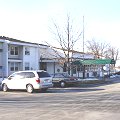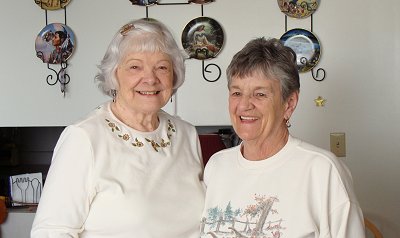- By Dan Veaner
- News
 Print
Print  Woodsedge will officially be a non-smoking facility beginning April 10. Currently the common areas of the Lansing independent living facility plus an area 50 feet outside the building have been non-smoking areas. But after two years with no smokers living in the building, a new tenant who is said to be a chain smoker alarmed residents enough to spark a chain of activism that resulted in the new policy.
Woodsedge will officially be a non-smoking facility beginning April 10. Currently the common areas of the Lansing independent living facility plus an area 50 feet outside the building have been non-smoking areas. But after two years with no smokers living in the building, a new tenant who is said to be a chain smoker alarmed residents enough to spark a chain of activism that resulted in the new policy."We were a little upset because we know that second hand smoke is not healthy, and most of us have health problems as it is," says resident Shirley Graves. "We wanted to keep it a smoke-free facility."
"Being on the second floor I'm concerned about fire," says resident Mary Kovacs. "We learned from many people that she was not only a smoker, but a chain smoker who has burned herself and her surroundings. We were most unhappy."
Management was willing to consider changing the rules to forbid smoking, but wanted consensus among residents. They asked tenants to be patient and to make sure all the residents were in agreement. But the smell of smoke was working its way through the building. Residents noticed smoke in the common areas and hallways, the smell was permeating their own apartments.
"This was not personal by any means," Kovaks says. "This was the general feeling of all the tenants that have multiple health problems already, and did not want them aggravated by the proven results of second hand smoke."
As a branch of the Town of Lansing, the Lansing Housing Authority (LHA) owns Woodsedge. LHA President George Gesslein says that he wishes the issue could have been considered sooner, but with the December LHA meeting canceled for the holidays tenants had to wait. "The board wasn't made aware of the seriousness of the issue as early as they could have been," he says.

Mary Kovaks (left) and Shirley Graves
By the end of October Graves and Kovacs turned in a petition with 42 signatures, representing all but two of the residents. The smoker and her mother, who is also a resident, declined to sign. But the smell of cigarette smoke continued to get worse.
"You had only to come in the outside door and it overwhelmed you," says Kovacs. "It started at our end of the building and progressing down the hall. We noticed it came further and further from one person smoking, but she smoked continuously. The management already knew that we were not happy with this. To accommodate us they even sealed her door, but it really didn't help. They were talking about putting air purifiers in her apartment, but that was not going to solve the problem."
"I spoke with other senior apartment managers in the area and they have had this problem but never to the extent that they felt it necessary to declare the apartments non-smoking areas," Gesslein says. "We thought the matter was under control with the common areas being designated non-smoking. A problem with the partial non-smoking designation became obvious when a tenant who smoked moved in and the smoke became noticeable outside the tenant's apartment."
The two women encouraged other residents to embark on a letter writing campaign to try to speed the process. Gesslein says the letters added credibility to their plea. "Written letters from the affected tenants were extremely important to assure that the concerns were more than just casual coffee gossip," he says. "It also took time to research the legal ramifications of making the building a non-smoking facility, including the apartments."
About three weeks ago LHA members arrived to find the meeting room packed with residents, where usually only two or three attend. Gesslein says that declaring a facility entirely non-smoking is unusual, but the opinions and desires of the Woodsedge tenants and board members' understanding of the negative effects of smoking and second hand smoke strongly influenced their decision. He notes board members were sympathetic in part because none of them are smokers themselves.
LHA had to get approval of USDA Rural Development before the policy could be officially changed. Rural Development holds the mortgage on the property, provides an interest rate subsidy, and rental assistance to many of the tenants. As such they approve all rents, budgets, leases, policies, and procedures. Gesslein says that state and federal fair housing laws have to be followed when changing and enforcing a new policy and lease terms. He says that final approval of legal counsel was required before Rural Development would agree to the change.
Graves and Kovaks says that all the residents but the smoker and her mother are delighted with the outcome. "It proves the old adage that when people get together for a common purpose you are always amazed at the results you accomplish," Kovaks says. "We would like to thank the Town of Lansing, Lansing Housing Authority, CRM, and Rural Development for taking into consideration our feelings and the health issue. We hope that if somebody out there is struggling with this it will help them become smoke free as well."
----
v5i7



